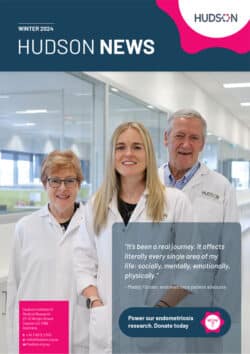Associate Professor Patrick Western
- Centre Head, Centre for Reproductive Health
- Research Group Head, Germ Cell Development and Epigenetics
- patrick.western@hudson.org.au
Oocytes (eggs) and sperm transmit the parents' genetic and epigenetic information to the offspring. My research is focused on understanding the epigenetic processes underlying the establishment of the germ cell lineage and the impact of transmitted epigenetic information on subsequent generations.

Areas of interest
Female infertility Testicular cancer
Research group
Germ Cell Development and Epigenetics
Biography
Interim Centre Head of Centre for Reproductive Health at Hudson Institute of Medical Research, Associate Professor Patrick Western’s research is focused on understanding the epigenetic processes underlying establishment of the germ cell lineage and the impact of transmitted epigenetic information on the next generation.
Associate Professor Western completed his doctoral studies on temperature dependent sex determination in the American alligator. He then moved to Professor Azim Surani’s laboratory at the Wellcome Trust Gurdon Institute, Cambridge University, where he studied epigenetic reprogramming and the reacquisition of pluripotency in differentiated somatic cells, embryonic stem cells and germ cells.
Associate Professor Western then joined the ARC Centre of Excellence in Biotechnology and Development where he pursued an interest in sex-specific germ cell development with a focus on the regulation of pluripotency and differentiation in early germ cells.
A/Prof Western leads the Germ Cell Development and Epigenetics Research group within the Centre for Reproductive Health at Hudson Institute of Medical Research. Using genetic and pharmacological models, the Germ Cell Development and Epigenetics Research group studies mechanisms regulating epigenetic programming in the germline and the impacts of germline epigenetic information on offspring development. The work combines discovery science with translational research aimed at developing clinically relevant information required for understanding the impacts of epigenetic programming on disease inheritance, and the potential interactions between epigenomic drugs and the germline epigenome, and subsequent outcomes in offspring.
READ MORE | Non-genetic disease inheritance – reading between the genes, Male health at conception could impact child health, Life as an explorer | mentors in science
Student opportunities

Publication highlights



